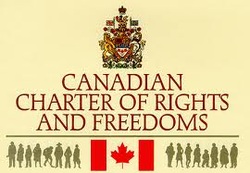
Right?
Two events this week underscore the Charter's weaknesses. The first is an . underreported court case in Ontario, Tanudjaja v Canada. In that case, a coalition including B.C.'s Pivot Legal Services argued that the Charter imposed an obligation on the federal and provincial government to ensure that affordable, adquate and accessible housing is available for all Ontarians and Canadians. The coalition argued that section 7 of the Charter, a guarantee of of "life, liberty, or security of the person" imposed that obligation.
The case was thrown out as soon as it was filed, before any evidence was heard. The court said that the Charter imposes no positive obligation on governments to do anything. If the government gets into the affordable housing business, it must do so in compliance with the Charter which among other things guarantees equality. But the government has no obligation to get into the affordable housing business if it doesn't want to.
So your 'right' as a Canadian to "life...and security of the person" doesn't include the right to eat, or be sheltered.
The second event - this one all over the news - is Quebec's intention to introduce a "Charter of Values" which would prohibit the wearing of some religious symbols (all except Catholic crucifixes, in fact) if you work in the public sector - government, hospitals, educational institutions.
This law does contradicts the guarantee of 'freedom of religion' and the guarantee of 'freedom of expression' in both the Canadian Charter of Rights and Freedoms and Quebec's own Charter of Rights and Freedoms.
Courts have consistently upheld the rights of religious minorities: for example in Multani, a affirming that Sikh boys could wear kirpans (a religious symbolic metal knife worn under clothing) to school; and in Amselem, permitting Jews to erect succah, a small ritual dwelling, on their balconies notwithstanding a rue of the luxury condo where they lived that prohibited balcony structures.
Queers have objected, unsuccessfully, that 'freedom of religion' should not be a licence to discriminate against queers just because they 'sincerely believe' that being queer is a sin. In Trinity Western, for example, queers lost an argument that the Christian College should be refused accreditation as a teacher's college because it required all students to sign a contract agreeing not to engage in sexual 'sins' including homosexuality.
So it seems obvious that Quebec's 'Charter of Values' would be thrown out because it contravenes the Charter of Rights. Because the Charter of Rights is part of the Constitution of the country any other law that conflicts with it can be declared null and void.
Right?
Not necessarily.
The Quebec government can throw in a 'notwithstanding' clause. Any government is permitted to enact a law which they know contradicts the Charter of Rights if they include a section that says the law is valid notwithstanding the Charter. If the 'notwithstanding' clause is included, the Quebec Charter of Values would be good for five years, after which it would have to be reenacted. Governments have to think twice about using the notwithstanding clause, because they know that every five years they will have to pay the political cost of enacting a Charter -violating law.
We queers must stand firmly with the religious minorities in Quebec, even though 'religious freedom' is often pitted against queer rights. Because what is at stake is our country's very soul. Unless we all recognize that conflicts among rights - religious freedom and queer rights, or any other conflict - must be settled by the courts, we will inevitably end up with the shameful spectacle of governments enacting legislation designed to hurt minorities just to get votes. And when that day comes, we will be among the minorities targeted for legislated bigotry.
The Canadian Charter of Rights and Freedoms is deeply flawed because it does not even pretend to address the worst inequalities among Canadians - the inequalities created and perpetuated by poverty. And the Charter is fragile: if ever it becomes politically acceptable to tack the 'notwithstanding' clause onto any piece of legislation which is currently in favour, all of our Charter rights will succomb.
But, as minorities of any kind - sexual, racial, religious, disabled, immigrant, women (though not a minority!) the Charter is all we've got.
 RSS Feed
RSS Feed
